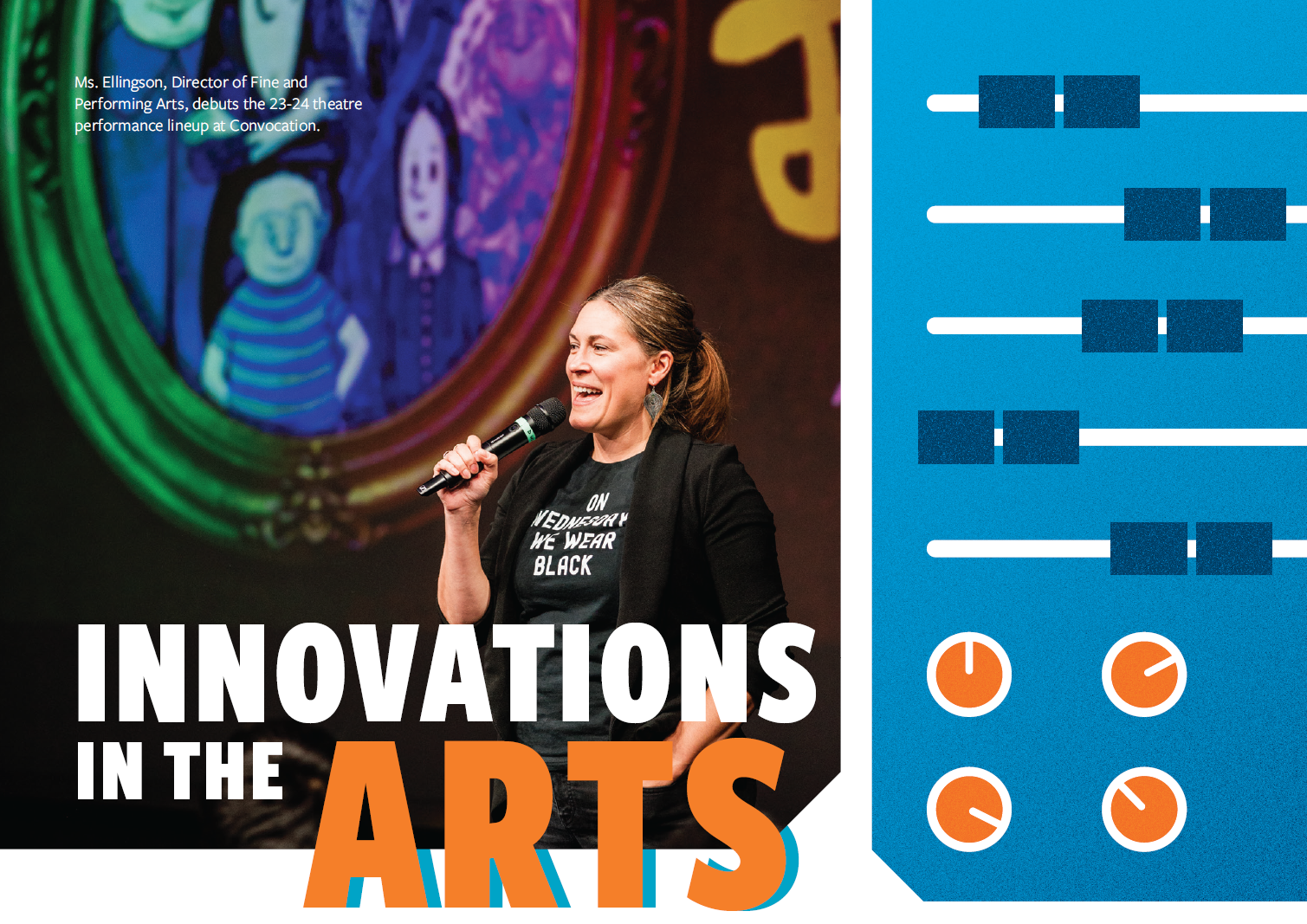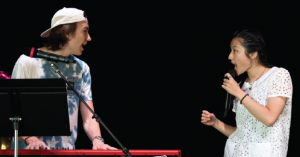
By Ginger Ellingson, Director of Fine and Performing Arts
The Fine & Performing Arts discipline and faculty are excited to introduce three new courses to the music offerings for Eastside Prep students: Music Theory, Music Production, and 7-8 Digital Music Studio. Through this process of programmatic innovation, we found inspiration in the values and goals that underpin our commitment to arts education.
Music is many things: art, physics, history, individual identity, community pastime, worship, and more. As a form of cultural expression, it functions to celebrate, mourn, and mark the passage of time. School-based music programs have a rich history of embracing communal music-making through ensembles such as choir, orchestra, and band. These large-group projects, known for fostering discipline and teamwork, have consistently proven beneficial for students’ brain development, well-being, and social connection. However, as EPS has grown, we recognize the need to extend music education beyond traditional performance ensembles. The recent development of three new courses, namely Music Theory, Music Production, and 7-8 Digital Music Studio, represents a significant step toward modernizing and diversifying our course offerings. These courses are designed to provide students with a pathway for individual musical expression, utilizing tools such as technology and composition techniques.
In aligning with the values of an EPS arts education, these courses uphold art as a fundamental form of human expression for all. The artistic process takes center stage: to create, connect, perform, and respond. Gear and equipment are tools or mediums for the artistic process, reinforcing the importance of the creative journey over the tools themselves. As in current art classes, students in these courses will experience and demonstrate learning by doing, knowing, and showing. The goals for this programmatic evolution are derived from the clarity of these values. With these additions, the F&PA aims to offer students a pathway in the individual pursuit of musical expression, to modernize and diversify course offerings in alignment with the 2023-2028 Board of Trustees Strategic Plan, and to provide a thinking curriculum that equips students with the tools to communicate their musical ideas in pursuit of the vision and mission of EPS.
This transformative journey originated in the challenges posed by pandemic restrictions, pushing us to innovate and explore new possibilities. It is widely accepted that constraints help with creativity and the constraints required for performing ensembles during that period made it quite impossible to continue any type of business as usual. Online and masked school forced the departure of old patterns. In fact, it prompted Dr. Castro and myself to explore the use of digital tools in the performance classroom. The digital realm became a fertile ground for experimentation, leading to the creation of the Digital Music Studio in 2022.
The new seventh- and eighth-grade version of the Digital Music Studio will extend this programming to the Middle School curriculum. This course focused on applied popular music theory and paved the way for the expansion into Music Theory and Music Production.
In Digital Music Studio, students study how the elements of music relate to one another in a popular music genre and demonstrate their learning through creating and recreating music. The new seventh- and eighth-grade version of the Digital Music Studio will extend this programming to the Middle School curriculum. This course focused on applied popular music theory and paved the way for the expansion into Music Theory and Music Production.
Music Theory is the study of the construction of music and how music works. A typical theory sequence takes two years to complete at the collegiate level. Because we have one trimester, the class will focus on a set of compositional exercises called species counterpoint. This content focus was chosen for several reasons. First, the students will be writing music, upholding the discipline values to do, know, and show. Second, students will be participating in a bit of music history and applying the compositional practices that gave rise to how we understand harmony to function today. After all, many names familiar to the classical music aficionado have practiced with this very set of exercises, including Haydn, Bach, Beethoven, and Brahms. And finally, the content is well suited for a classroom that must be differentiated. Each grouping of compositional rules (species) is graduated in difficulty, offering a sequential system for students with varying degrees of prior knowledge.
Extending music education in the other direction, toward making music with modern tools, is a course called Music Production. Using industry-standard technology, students will develop the skill and knowledge to effectively understand, hear, and implement the tools, concepts, and processes to design music. As recording and production technology becomes more accessible and “the studio” moves on to computers, artists are doing more and more from their homes, requiring little more than a laptop. The content of the Music Production course will include recording, mixing, editing, and creating music using a digital audio workstation.
Two other innovations in the traditional performance ensemble in school preceded this recent stage of programmatic evolution. The first, added in 2019, is Rock Orchestra. After years of fielding interest from guitarists and others, Dr. Ed Castro started Rock Orchestra to include instruments and genres not typical of traditional instrumental ensembles. Similarly, in 2022, the singers’ counterpart was added in the form of Rock Vocal Studio. In this class, students learn singing and recording techniques of popular music, and performance is optional; students may choose to record instead. In both classes, iconic and essential American music serves as performance material and as cultural artifacts of a time and place, and students learn the context behind the creative inspiration for the material.
In this recent phase of innovation, the new music course triptych of Theory, Digital Music Studio, and Music Production will be offered over the course of the year, such that there will always be a non-performance class option for a student who wants to study, learn, and create music. These courses are complementary education for the current ensemble performance program, and additionally, we hope to reach a new audience of students by centering the individual creative process. Students may take one or more of these courses over their EPS Upper School career, and taking all three will be a comprehensive education in developing musical tools to express creative ideas. The F&PA celebrates this step in diversifying opportunities for students in musical expression, and by empowering students with the tools to articulate their musical ideas, we aim to propel them toward the realization of the EPS vision and mission.


